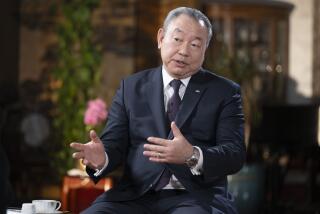Taiwan’s Lee Stresses Confidence : New President Urges Reconciliation and Democratic Reform
- Share via
TAIPEI, Taiwan — President Lee Teng-hui, nearing the end of the first full-scale presidential press conference in Taiwan in 13 years, suddenly leaned over the podium Monday and blurted out the real message of the occasion.
“Self-confidence!” he called out, indicating that he was referring to himself by pointing to his nose in the East Asian manner. His words carried the broader meaning that Taiwan should look confidently to the future.
Lee’s confidence had already become evident as he called for reconciliation among different groups in Taiwan, demanded democracy in China as a precondition for reunification and promised to cooperate with the United States in trying to resolve trade problems.
Concern Over Conflict
After the death last month of President Chiang Ching-kuo, who never gave a large formal press conference, some observers thought that Taiwan might be headed for a period of political conflict and a halt to the recent movement toward democratic reform.
Lee, a native Taiwanese from the reformist wing of the ruling Nationalist Party, had been vice president largely due to Chiang’s support. Some observers believe that conservatives in the party do not want to see Lee become a powerful president.
However, on Monday, Lee showed candor, restraint, humor and anger as he spoke like a man who considers himself in charge. He also made it clear that he intends to continue with the reform, which is basically aimed at making the government more responsive to the people of Taiwan.
For instance, one questioner described policy-making power as shared by Lee, Premier Yu Kuo-hua, Nationalist Party Secretary General Lee Huan, and National Security Council Secretary General Chiang Wei-kuo, brother of the late president. In response, Lee said the importance of the Security Council should be reduced and that the role of the party secretary general is to help the president.
“As for who will be responsible for major policy decisions, I don’t foresee any difficulty,” he said. “That responsibility is mine.”
In regard to relations with mainland China, from which the Nationalist government fled in 1949 after defeat by the Communists, Lee implied that there might be some continued growth in person-to-person contacts.
A policy initiated last fall that allows residents of Taiwan to visit relatives in China will be reviewed in a few months, he said.
“At the same time,” he said, “the question of the possibility or advisability of sports in cultural exchanges will also be examined.”
Asked whether direct trade and investments in China might be allowed, Lee replied that “for the present time, I believe we are unable to proceed with this issue.”
‘No Contact, No Compromise’
Taiwan will continue its policy of “no contact, no negotiation, no compromise” with Beijing, he said.
China, he said, must give up communism and become democratic before reunification can be achieved.
“There are two very important aspects to the mainland regime’s current policy toward Taiwan,” he went on. “One is that they have never repudiated the possibility of reunifying China by military force. These words seem very forceful. Indeed, they seem to be saying, ‘I’m more powerful, and I’ll strike you if you are not obedient.’ This attitude itself causes a problem.
“The other is that they are promulgating the ‘one-country-two-systems’ idea, and treating us as a local government.”
The answer to the problem, Lee said, is for Taiwan to press forward with political reform.
“The faster we progress, the faster and more thoroughly we carry out our political reform, the more the mainland will be unable to go in any other direction,” Lee said.
As for trade relations with the United States, Lee said that Taiwan “is more serious than any other country about solving trade differences with the United States.”
“Our economic strengths remain very limited,” he said. “However, we would like to show our greatest sincerity in international negotiations. We are willing to offer our help to solve any United States problem.”
Taiwan is committed “to reduce our trade surplus with the United States from more than $16 billion (in 1987) to slightly over $10 billion this year,” he said.
More to Read
Sign up for Essential California
The most important California stories and recommendations in your inbox every morning.
You may occasionally receive promotional content from the Los Angeles Times.













